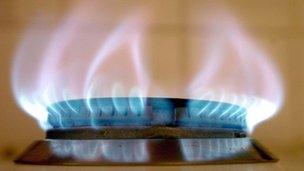Why gas prices are so politically hot
- Published
- comments

What's the bit of economic news that voters have noticed more than any other since the coalition came to power?
Was it the £6 billion of spending cuts made six weeks after they came to office?
Or the day the chancellor had to admit that the government had missed its borrowing targets? Or the moment inflation hit 5%? No, none of those.
It was, researchers have told ministers, the day one of the energy firms increased its prices by 20%.
This was no mere statistic or forecast or description of the general state of the economy. It was over two hundred quid out of the pockets of the average household who bought their energy from that company and the prospect of the same for millions of others.
That's why the government has reacted so swiftly to allegations that the energy firms are price fixing.
It's why David Cameron said something his energy secretary Ed Davey knew nothing about when he promised to legislate to ensure customers paid the lowest tariff available. Behind the scenes they're still trying to work out how to refine and deliver that promise.
It's why there is a ferocious Whitehall row going on about new green energy targets: the Treasury fears they will drive up bills still further whilst the Department for Energy and Climate Change (DECC) insists they will create green jobs for the future.
George Osborne believes that cheap gas could boost the economy just as North Sea oil once did.
The energy secretary is insisting that that should not mean abandoning targets for electricity from renewable sources.
All this in a week when British Gas is imposing a price rise of 6% for gas and electricity meaning that, according to the energy account transfer service uSwitch, the average household bill for a dual-fuel British Gas customer will go up from £1,260 to £1,336 a year.
This issue of gas is hot. Very hot.